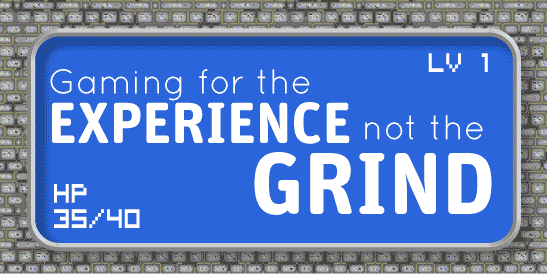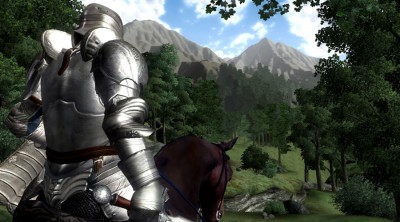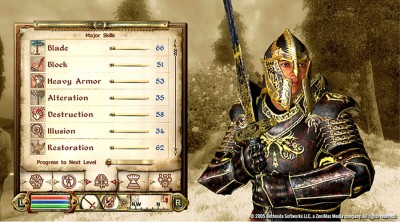I love The Elder Scrolls. I love delving into online FAQ’s, reading through the inner workings of the game, and using that data to craft the perfect character. I love planning out every aspect of my hero’s development long before I’ve even shaped them in the character creator. I love using guides to ensure that I get the best loot from every dungeon and quest. I love one-shotting enemies on the hardest difficulty with my optimized, godlike avatar.
I’ve been doing it wrong.
Role Playing Games appeal to me as a gamer. They’re free of the chest-bumping, hyper-competitive nonsense which has plagued multiplayer games since the advent of online gaming and professional gaming leagues (to be fair, gaming has been competitive since the arcade era, but it is much more so today). Role Playing Games are about creating a narrative – an experience which isn’t dictated in cutscenes but is tailored by your character’s impact on a well-conceived virtual world. In this way, true RPGs are akin to open playgrounds. Every trip up and down the slide, every castle built and destroyed in the sandbox, and every scraped knee creates an experience unique to each individual. There is no right or wrong way to play and no inherent winners or losers. There is only the act of playing. And when I was concerned more with stats and level grinding than I was with crafting myself a meaningful narrative, playing is exactly what I wasn’t doing.
We’re all guilty of it – hitting up the internets to see which item or spell would better fit our characters, which dialog branch we should pick to boost our favor with certain NPC’s, or which quest to hit up next in order to make our lives easier. And ultimately, that’s what it’s about: making our gameplay experience easier. By having a trusty FAQ open on one monitor and our game on another, we can prevent ourselves from making sub-optimal decisions regarding our characters. All this is ok to a point. But eventually we stop making decisions for ourselves. We reach a point where we’re scared to make mistakes, scared to experiment, and scared to deviate from the path. This is when we have to stop and reassess our approach to gaming.
I fell into this trap when playing Morrowind, and again when playing Oblivion. At first it started as a good-natured desire to understand and exploit the game system. I would find ways to make absurd amounts of money (re: Alchemy for profit), and then use that money to train my skills up to the limit. This resulted in hours of crafting potions, selling those potions for profit, tracking down trainers, and giving them massive amounts of money to increase my skills. The developers at Bethesda sought to prevent this in Oblivion by limiting the number of times a character could receive skill training per level. Since I could no longer train to my heart’s content, I had to grind in order to raise my skills.
It took dozens of hours of grinding for me to realize I wasn’t having fun any more. The game was no longer about creating a unique character – it was about creating the best character. It was about potions, skill trainers, and how many more times I would have to cast my “Shield” spell in order to raise my Alteration skill. I ignored the story and the ambiance, and focused on the algorithms and the equations. Don’t get me wrong, the math governing the game world is important and can be explored and appreciated separately from the game proper – but when the math becomes the game, you have a problem. When you make a decision based on what’s written in a FAQ instead of what you feel your character would do, things fall apart. The narrative is abandoned, the immersion destroyed, and the player left with no attachment to their character.
So I allowed myself to make mistakes. I allowed myself to play as fun characters, to learn by doing and succeeding and failing. I took part in creating characters like Space Cannibal Abraham Lincoln from our Fallout New Vegas charity marathon. And the most important thing about those characters? I remember them. Space Lincoln was a badass patriot with a rebar club, spaceman suit, and a penchant for feasting on the flesh of his fallen enemies. He went on to consume the faction leaders of New Vegas and claim their strength for his own, like an ancient warrior feasting on an enemy’s heart to gain his courage. Space Lincoln kicked ass.
What I don’t remember are all those nameless, godlike characters I made in Oblivion. I remember most of them were female Bretans, since they had increased magic resistance and mana pools. I remember that I raised Endurance first for the boost to my health points, and that I took Alchemy as a primary skill for easy levels and Destruction so it wouldn’t be as difficult to grind. But I don’t remember what those characters were. I abandoned them just as hastily as I created them. They were nothing more than a collection of stats into which I poured a ridiculous amount of game time.
I’m looking forward to Skyrim to redeem myself in the eyes of the Elder Scrolls series. While the internet obsesses over each screenshot and trailer, wondering how skills will be rebalanced and obsessing over everything from the interface to the combat mechanics, I will be thinking up new characters. I’ll ignore the hype, ignore the trailers, and prepare myself to plunge in with as little knowledge as possible. I’ll be ready to learn, ready to try everything for myself, and ready to play. And this time, I’ll do it right.




It’s also not a coincidence that New Vegas lends itself to roleplaying while Oblivion and, to a lesser degree, Morrowind, do not. It’s not all the player’s fault for not caring. Delivering an interesting world with believable characters and functional RPG mechanics is key for roleplaying to work.
I roleplay every single RPG i can find, and in Oblivion, it’s just a hard thing to do. How can you roleplay, when being the leader of the Thieves’ Guild, captain of the Guard and a contract assassin, at the same time, is a possibility? You could always choose not to follow any of those options, but good design would be for one to deny you the other. Bethesda themselves fixed that in Fallout 3 and they’ll probably get it right in Skyrim as well.
Good roleplaying is only possible with collaboration of developer and player. The developer has to drive the player towards roleplaying and limit the player’s options while allowing the correct ammount of freedom for actions to feel meaningful. After that, it’s up to the player to take advantage of the dev’s work, if they want to.
And in my opinion, if you let go of making the optimum character and just suffer through not knowing where your other options would lead to, it makes for a much better experience, one that you end up remembering. And, of course, it’ll take subsequent replays to see all the game has to offer but, if it’s a huge game like New Vegas, the possibility to roleplay it all again, without needing for meta-gaming and seeing-all-options playthroughs, is still there.
Btw, good luck on your roleplaying endeavors, Justin : )
You can try, if you haven’t already, Bloodlines or Fallout 1 or 2 or Arcanum to see roleplaying made easy for the player.
I think F3 and FNV lend themselves to roleplaying because you don’t have to worry about grinding your skills to level them up. The game gives you ample opportunities to earn experience, so in general you’ll probably hit the level cap before you finish your playthrough.
That said, from a gameplay design I’m not entirely fond of FNV’s leveling system. It feels wrong to gain a level by killing things with melee skills, picking locks, and hacking computers only to spend the resulting skill points on energy weapons.
The funny thing is that for me, those games hold very little interest most of the time. For me what builds the experience is the story that is there for me to use. I want to play through an epic story, not some garbage story I put together myself.
If *I* were a good story-writer, I would be doing it professionally. I know this, so the stories I create for myself don’t hold any thrill for me. The open world games I’ve played, the sandbox characters I’ve made, none of them are memorable. I don’t remember anything about DA:Origins except that the story was terrible, for example.
The games I remember fondly are the ones with an incredible story where I got to experience the brilliance of a talented writer. The games like Final Fantasy 13, or Starcraft 2, or Xenogears, or even Mini Ninjas(where the story was more cute than brilliant, but still the game sticks in my mind). That is what I remember. These open world games, the Dragon Age: Origins, the Oblivions, etc… they really don’t have much to offer me. I don’t NEED a game to imagine an epic story myself… when I play a (non-multiplayer) game I do it for the same reason as I read a novel – to get to experience something of beauty that someone else has created.